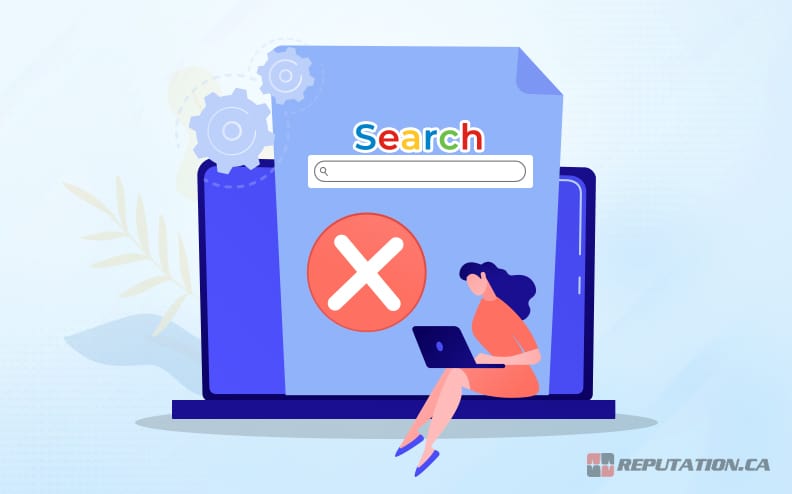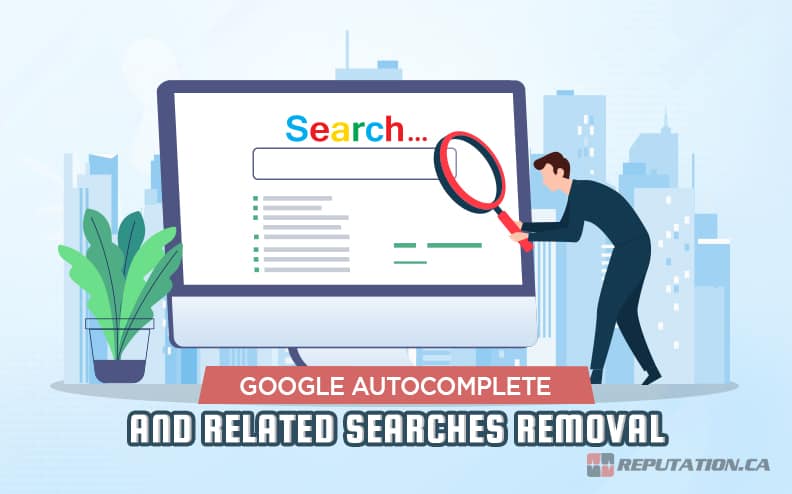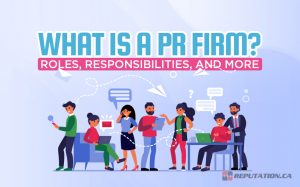The internet has become the most reliable source of information on the planet. With a few taps on the keyboard, anyone can access information about anything. Be it information on a company, service, product, or person, a Google search can find what you are after.
The popularity of Google as a search engine has led to the development of an algorithm to help get results quicker. This algorithm observes patterns in a user’s search history, generates related searches, and automatically autocompletes search terms. Unfortunately, while this was meant to make things simpler when looking for information, it inadvertently introduced a new issue that can make browsing the internet a nuisance.
While autocomplete and related searches can be beneficial in some cases, they can also be problematic. Sometimes, autocompleted results lead us to the wrong search result and taint related searches. This can clutter your future searches and make finding information more difficult. However, this can also impact the information that surrounds certain individuals and corporations.
The search algorithms employed by Google and other search engines tend to absorb the most popular search terms and offer them to everyone who enters a specific word. This means negative information surrounding these entities is easier to locate. Figuring out how to counter these functions can be essential to protecting your public image.
How Does Google Autocomplete Work?
If you have spent time on Google, you will likely understand how Google’s autocomplete function works. Simply put, Google’s autocomplete function uses the search algorithm to analyze what you are typing into the search bar and attempt to automatically fill out the rest based on your previous search history. However, it also uses the searches made by other users worldwide to contribute to what you might be looking for on the search engine. This autocomplete function is meant to make finding information easier for users worldwide. However, it can sometimes hurt certain entities.

Google’s algorithm is not well known since the code is kept under wraps. However, a few details seem to factor into what parameters Google offers with the autocomplete function. Unfortunately, there is no guarantee that these details play a role in Google’s predictive matrix. Currently, it is believed that the following online habits affect how Google’s autocomplete system works:
- The number of keywords associated with the subject of the search.
- The number of times the subject is researched on Google.
- The location the search originates from.
- The frequency of those keywords or the subject of the search on social media posts.
Google’s autocomplete program seems to take the main subject of the initial search and pair it with associated keywords that are seeing a lot of activity. The more people look up a specific keyword in association with the person or company you are looking up, the more likely those keywords will be suggested by Google.
Autocomplete is not the only predictive matrix employed by the Google search engine. To help its users access as much information as they might want, Google offers a function that connects the main results to related ones. These related search results are loosely based on the parameters of the original search but are made using different keywords altogether. This tangential search means that any additional information associated with the subject of the search becomes available to the user. Unfortunately, these related searches are usually populated with results from searches that are associated with false statements or outdated data.

The related searches are only slightly similar to the initial search made by the user and seldom have anything to do with what they want to discover. However, some searches have enough in common with other results that Google tries to nudge the user in that direction. This can often have serious consequences on the reputation surrounding the search’s subject. This can make corollary results drag down the ones important to the search and mislead the user about the facts surrounding the subject they have looked up on Google.
However, the way these functions work and impact you are very different concepts. Knowing what is at risk when these searches lead to negative results is important if you want to preserve your public image.
How Does This Affect You?
Ordinarily, it might seem like these functions of Google are relatively harmless and should not be of concern to you. However, these autocomplete and related results can have severe drawbacks that drag your reputation down into the mud. The reason is that we, as a society, are drawn to negativity and seek out any negative information surrounding you or your business. This originally served as a defense against shady business practices. However, it has become a more dangerous practice as the reputation of an individual or company can now devastate their livelihoods.
People who use Google to research you or your company will look for specific information. Some users will look into potential misconduct on your part that will dictate the types of results the autocomplete function will suggest to future users. For example, if a rumor circulates among even a portion of Google users that you have faced a lawsuit for alleged misconduct, they will likely begin researching it. The more who research these allegations, the more likely future users who only type your name will see those searches in the autocomplete suggestions.

Let us say that GeneriCorp has been brought into the spotlight due to a lawsuit filed by a disgruntled customer. Even though the case is resolved and the situation is rectified within the eyes of the law, future customers will be made aware of the lawsuit through media outlets. They will attempt to learn more about it via Google searches. The more people look into this lawsuit, the more likely Google is to suggest it to users who are still typing their questions. This means that, more often than not, the average user who looks you up for the first time will be greeted by the suggestion “GeneriCorp lawsuit” before they even read about what your company does.
Google’s ‘related searches’ function brings a similar issue to the table. If a user looks up a different company in the same industry as GeneriCorp that also went through a lawsuit, Google might offer GeneriCorp’s situation as a related result. This is not always the case, but the related searches will often correlate your company’s situation to those of other companies. Similarly, the related searches will also connect any Google searches for GeneriCorp to media posts that use keywords relating to the situation.
The Google autocomplete and related searches function of the search engine can be very detrimental to your reputation. Whether you are an individual or representing a company, these functions can drag your reputation down if you do not take steps to stop it. The only challenge is figuring out how to control the results these functions yield.
When you face reputational damage due to Google’s autocomplete function, you probably want to find a way to disable them. Unfortunately, you are in for some bad news in this regard. There is no direct method for disabling the Google autocomplete system or preventing related searches from popping up. These functions are directly controlled by Google and are inherent to the search engine, with no option to disable them unless the user adjusts their settings when using Google. So, you have no way of removing these results from the database.
However, just because these functions cannot be disabled does not mean you cannot fight back. As we mentioned before, the way this algorithm works is that it takes major keywords associated with you or your company and uses them to guess what kind of information the user is after. It also directly affects the articles that are pulled up in the results. This means that those keywords directly impact what results come up when you or your company’s name is Googled. This is where you can act against the algorithm and repurpose it to your advantage.
The trick lies in using the keywords used in your industry concerning you or your company. Once you grasp these keywords and how they affect you and your business, you will have the tools you need to use the algorithm beneficially. To start, you will need to identify the most common terms added to Google searches about you or your business. Once you have identified the most popular search parameters, you can properly identify the course of action needed to fight back.

For example, are the most common suggestions about your service reviews? This is perhaps one of the most time-consuming aspects of managing Google results. Reviews greatly affect the general perception of you and your business. Reviews can be managed and addressed through an official representative of your business to tend to your customers’ grievances. By addressing the source of their concerns and working to resolve them satisfactorily, you can improve the overall quality of the reviews since you show a distinct interest in trying to compensate them for their poor experience.
By improving your reviews, you alter the algorithm so that any autocomplete results for “GeneriCorp reviews” or “GeneriCorp bad reviews” will only lead to improved reviews. This will help prevent the reputational damage that the algorithm would otherwise cause. However, reviews are not the only thing you will need to consider when tweaking the algorithm. You will need to find a way to turn the keywords used in most internet media to describe you into a tool to improve the perception of you and your business.
Your business’ website is more than just a host for all your services and product information that your customers might need. You can also use it to relay information about the industry and why companies like yours are important. You can post articles written by your staff to use the same keywords they use against you to drive more traffic to your website than those of the online media outlets. This way, the algorithm serves as a tool for your benefit rather than a detriment.
While you cannot disable Google’s autocomplete and related search functions, you can use them to your advantage. However, you will need to commit to a reputation marketing plan to help bring your company’s content above the 3rd party content found on Google. Doing so can be time-consuming and use a lot of resources up, but if you need some assistance, there are other options.
Take Your Reputation Back
Google is one of the world’s most powerful and popular search engines, with millions of people using it daily. Unfortunately, the wonderful advantages this search engine has brought can be quickly commandeered to destroy people’s reputations. This means you must try to counter the algorithm’s harmful effects if you want to maintain a successful company.
Figuring out what data is being used against you is paramount to turning the Google autocomplete system into a tool rather than a trap. The same applies to the related search function of the engine. However, the effort that goes into managing your reputation can be more than a single entity can handle. Fortunately, there is help available.

We at Reputation understand the value of a business’s reputation and the reputation of the person running it. That is why we have made it our mission to help you counter the details that could negatively impact your reputation and restore your image in the public sphere. We offer services that help with review management, social media posts, and public relations efforts so you can keep your reputation shining bright. In so doing, you can counter the autocomplete or related search function of Google’s engine. So, if you want to take your reputation back, check out our website today and see how we can be of assistance.
Do you have any questions about the Google autocomplete or related searches functions, or how you may be able to use them to your advantage? If so, please feel free to reach out and contact us at any time! We’d be more than happy to go into further detail about the topics and assist you however we possibly can!











